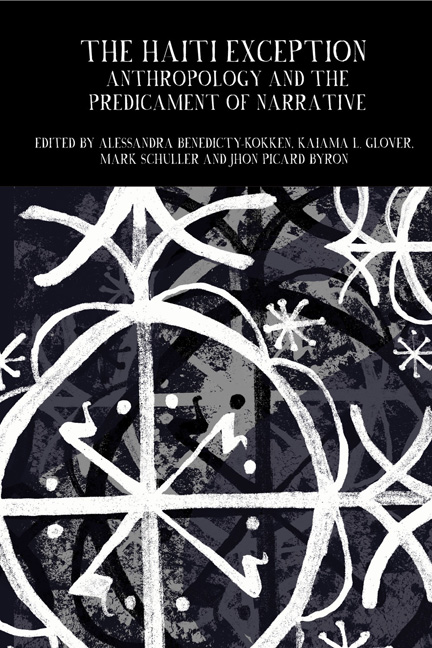Book contents
- Frontmatter
- Contents
- Editors’ Introduction
- I Tracing Intellectual Histories
- The Anthropological Uses of Haiti: A Longue Duré Approach
- Transforming Ethnology: Understanding the Stakes and Challenges of Price-Mars in the Development of Anthropology in Haiti
- On ‘being Jewish’, on ‘studying Haiti’ … Herskovits, Métraux, Race and Human Rights
- Haiti, Gender and Anthrohistory: A Mintzian Journey
- II Interrogating the Enquiring Self
- III On Nation-Building: Histories, Theories, Praxes
- Epilogue: Kalfou Danje: Situating Haitian Studies and My Own Journey within It
- Notes on Contributors
- Index
The Anthropological Uses of Haiti: A Longue Duré Approach
from I - Tracing Intellectual Histories
- Frontmatter
- Contents
- Editors’ Introduction
- I Tracing Intellectual Histories
- The Anthropological Uses of Haiti: A Longue Duré Approach
- Transforming Ethnology: Understanding the Stakes and Challenges of Price-Mars in the Development of Anthropology in Haiti
- On ‘being Jewish’, on ‘studying Haiti’ … Herskovits, Métraux, Race and Human Rights
- Haiti, Gender and Anthrohistory: A Mintzian Journey
- II Interrogating the Enquiring Self
- III On Nation-Building: Histories, Theories, Praxes
- Epilogue: Kalfou Danje: Situating Haitian Studies and My Own Journey within It
- Notes on Contributors
- Index
Summary
In 2010, Haitian-American anthropologist Gina Athena Ulysse sounded a clarion call for textual production about Haiti. Analysing the continuities of narratives that have denigrated the Haitian people since the revolution, which Haitian anthropologist Michel-Rolph Trouillot declared ‘unthinkable’ (Trouillot, 1995), Ulysse pointed to their excesses during the disaster porn that followed the earthquake of 12 January 2010. The challenge quickly spread throughout Haitian Studies, eloquent in its clarity and apparent simplicity: Haiti needs new narratives (Ulysse, 2012 and 2015b). However, actually producing these new narratives requires continual interrogation, unflattering reflection and profound self-critique. Anthropologists have been engaging in a self-critique since at least 1986; the text Writing Culture (Clifford and Marcus, 1986) is often marked as central to this. And yet, have our basic premises and praxes changed?
The title of this book, The Haiti Exception, calls into question the ways in which the island nation has been exceptionalized, singled out, by writers, especially those of us who are foreign. Indeed, Haiti's singularity – born of the first and only slave revolt to result in nationhood, its fall from the phenomena of ‘pearl of the Antilles’ to the ‘poorest country in the hemisphere’, and the white supremacy, imperialism and later ‘development’ – was one of its primary attractions for many scholars, including myself. However, focusing on this singularity obscures the ways in which Haiti has also served as a testing ground, a laboratory, for general anthropological theories, not to mention for international aid, as the two are often linked. In addition to the textual production, it behooves us to interrogate the political economy of knowledge production: to wit, what and whose interests are being served by anthropological knowledge on Haiti? In addition to the texts (i.e., the product), other elements of the research (i.e., the process) deserve attention. Gérarde Magloire and Kevin A. Yelvington (2005) offer a powerful reminder of Haiti's construction within and by anthropology. Trouillot calls into question the difference between location, locale and locality (Trouillot, 2003: 122–25). How, as practitioners of this craft, are we complicit in the political and economic inequalities that render Haiti open to the gaze of foreigners in the first place? Are there alternatives to this knowledge production?
- Type
- Chapter
- Information
- The Haiti ExceptionAnthropology and the Predicament of Narrative, pp. 15 - 32Publisher: Liverpool University PressPrint publication year: 2016



